_________________________________________________________

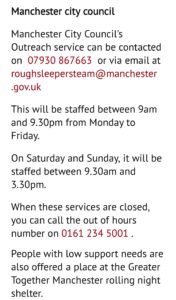

_________________________________________________________




Do you work in the area?
Are you involved with local community groups?
Do you want to be part of shaping the future of Chorlton, Whalley Range & Fallowfield?
Come along for a free lunch, meet new people and discuss what truly matters to you in Chorlton, Whalley Range & Fallowfield!
For more information, including dietary requirements, contact Aron at Aron.Thornley@gmmh.nhs.uk / 0161 271 0505 or Dawn at Dawn.Harris15@nhs.net
To keep warm and well during spells of cold weather:
Public Health England’s cold weather plan – https://tinyurl.com/y77ty3a8 – has tips on how to protect your health during cold weather.
Make sure you are receiving any benefits you are entitled to, such as the Winter Fuel Payment and Cold Weather Payment.
The Met Office has advice on getting ready for winter and some suggestions for practical things you can do to prepare for winter weather, including cold, ice and snow, high winds and flooding. The advice also tells you ways you can save money.
Icy pavements and roads can be extremely slippery. Take extra care if you go out, and wear boots or shoes with good grip on the soles. The Met Office advises putting grit or cat litter on paths and driveways to lessen the risk of slipping. It adds you should wait until the roads have been gritted if you’re travelling by car.
Bear in mind that black ice on pavements or roads might not be clearly visible, and compacted snow may turn to ice and become slippery.
The Met Office provides the weather forecasts for broadcasts on radio and TV, so listen in to these bulletins regularly to keep up-to-date with the weather. Severe weather warnings are also issued on the Met Office website, through the Met Office Twitter feed, or you can ring the Weather Desk on 0870 900 0100.
Check up on friends, relatives and neighbours who may be more vulnerable to cold weather. Cold weather is especially dangerous for older people or people with serious illnesses, so check in on them if you can. Read about how to spot and treat hypothermia.
People with heart or respiratory (breathing) problems may have worse symptoms during a cold spell and for several days after temperatures return to normal.
You can find more information and advice on staying healthy in periods of cold weather in Winter health.




Save in the kitchen
News from Manchester Cares
MCR Cares – February Programme
Winter Wellbeing Flyer (updated for 2019_20)
Computer Classes
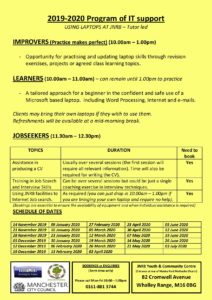
Latest Newsletter from Age-friendly Manchester
|



Winter Wellbeing Flyer (updated for 2019_20)
_________________________________________________________________


D
|
|
|
|
|
Are we getting there?
Age-friendly transport across Greater Manchester
Greater Manchester Older People Network Conference Report – Liz Jones, Macc
The following 23 questions were raised by participants during the course of the morning workshop.
Some were posed to Andy Burnham and the expert panel in the afternoon. The rest have now been submitted to Transport for Greater Manchester and the Greater Manchester Ageing Hub for responses.
11.Why isnt parking on pavements illegal in Greater Manchester?
12.Is a congestion charge for Manchester a consideration looking ahead?
13.How do we propose to make community transport more age-friendly, along the lines of the Ring and Ride scheme?
14.When is re-regulation of buses going to happen?
15.Can transport links/routes be linked or better integrated with hospital and health care locations? For example, having maps on display of bus, tram and train routes, indicating stops and routes for local hospitals and health centres.
16.Promotion what currently available, such as taxi vouchers, hailer cards etc. While these are available, they are not sufficiently known about. How do people find out about these? Can they be promoted more widely and at relevant times?
17.Are you surveying older people satisfaction of public transport? If so, can you share the results with the GMOPN?
18.Do you think it is right to ask people to surrender their bus pass in order to qualify for the taxi voucher scheme? Could both offers be flexible?
19.How do we help people not on main routes? Even a five-minute walk can be a real challenge.
20.Who can we can communicate with to get answers to questions and to be able to feed our ongoing concerns into transport planning?
21.Can we have real-time information displays at bus stops, as the case with trams and trains?
22.How are you going to better synchronise the bus, tram and train services?
Once we have received responses, we will publish a set of replies on our website at
www.manchestercommunitycentral.org/policy-and-influence/gm-older-peoples-network
Read the report below:
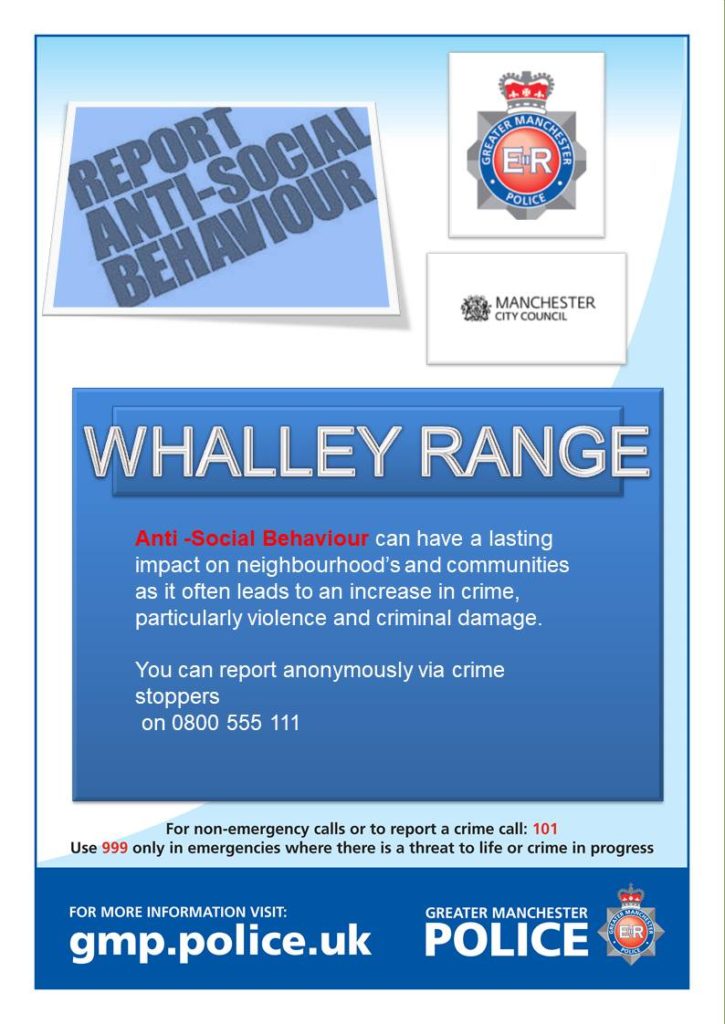
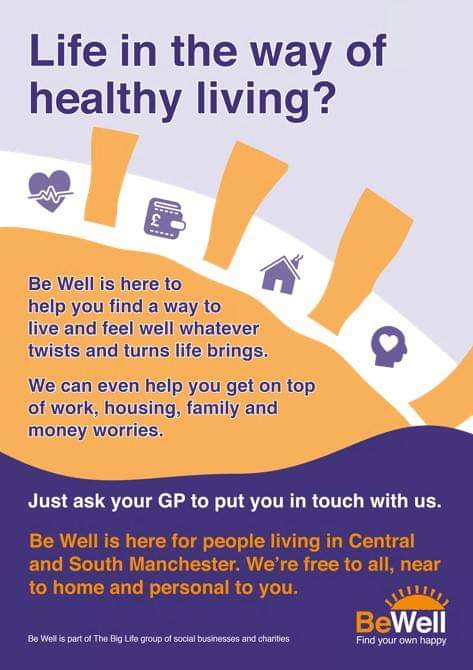
Be Well meet with residents in various venues – including JNR8.
If you think that you could be helped by ongoing support in the community, rather than just by a medical approach, Be Well can help. They offer support to members of the community on a one-to-one basis to help them achieve goals around their health & wellbeing.
You can speak to your GP surgery and ask to be referred – or take advantage of this self-referral pilot scheme below.
Up until Friday 30th August, anyone who is registered with a GP at one of the seven surgeries based within the Chorlton, Whalley Range and Fallowfield neighbourhoods can self-refer to Be Well. These are:
Princess Road Surgery (Fallowfield)
Chorlton Family Practice (Chorlton)
Corkland Road Medical Centre (Chorlton)
Wilbraham Road Surgery (Chorlton)
Ashville Surgery (Whalley Range)
The Alexandra Practice (Whalley Range)
The Range Medical Centre (Whalley Range)
Read more here:
https://www.thebiglifegroup.com/service/be-well/
In Greater Manchester, we have a much higher number of people that are in contact with mental health services than many other parts of the country.Yet research into mental health has also not always focused on the issues that are relevant or important to local people.
This is why Health Innovation Manchester (HInM) and the Greater Manchester Health and Social Care Partnership (GM HSCP) want to work together with residents to make sure research focuses on what matters to local people.
Have your say on the mental health research priorities in Greater Manchester by completing this short survey: Click here
A consultation on the proposed bus franchising scheme for Greater Manchester is currently taking place.
It’s your chance to help shape the way bus services are run in the city region.
The proposal would place buses under Greater Manchester’s control, which would allow decisions about fares, timetables and routes to be made centrally – much like in London.
Three-out-of-four public transport journeys in Greater Manchester are made by bus, so we’d appreciate it if you took the time to share your views.
An improved and more widely used bus service would have a positive impact on health – fewer cars being used would result in less congestion and less air pollution.
If you live or work in Manchester, we are interested in hearing about your experiences of using local pharmacies. Your views will help shape the way services are being delivered in the future. Complete the 2019 pharmacy needs assessment online; it will take approximately ten minutes
Over the Counter Medicines
People in Manchester are being asked to give their views on the recommendations by NHS England to change how some medicines are prescribed.
On average the NHS spends around £569 million a year on prescriptions for medicines that you can buy yourself from a pharmacy or supermarket without needing a prescription from a doctor. For example, pain killers like paracetamol.
NHS England have created new guidance to stop doctors giving prescriptions for medicines for 33 small illnesses. Please complete this survey so that we can understand how these changes will effect Manchester’s patients, public and local communities.
It very important to ensure that your skin isnt exposed to the sun for long periods, as this can lead to sunburn and make you more susceptible to skin cancer. Anyone can develop skin cancer, so it important to protect yourself whatever your skin type.
Although it important to protect your skin, some direct exposure to the sun is essential for the production of vitamin D.
Dont let your skin burn, but try to go outside once or twice every day without sunscreen for short periods from March to October. The more of your skin that is exposed, the better your chance of making enough vitamin D.
There are some food sources of vitamin D – salmon, sardines and other oily fish, eggs and fortified spreads – but sunshine is the major source.
The Government recommends vitamin D supplements for some groups of the population, including people aged 65 and over.
If you think you could be at risk of not getting enough vitamin D, particularly if you are housebound or cover your skin for cultural reasons, raise this with your GP. Always speak to your GP before starting to take a vitamin supplement or over-the-counter medicine on a daily basis.
Extreme heat and dry conditions can cause you to dehydrate and your body to overheat.
It important to eat a balanced diet to help your body replace any salt you lose by sweating. Aim to drink 6 – 8 glasses of liquid a day, and more if it hot.
You may also need to be careful if youre taking some types of medication that affect water retention. Speak to your GP if youre concerned.
Watch out for certain signs – particularly for muscle cramps in your arms, legs or stomach, mild confusion, weakness or sleep problems. If you have any of these, rest in a cool place and drink plenty of fluids. Seek medical advice if your symptoms persist or worsen.
The symptoms of heat exhaustion include headaches, dizziness, nausea or vomiting, intense thirst, heavy sweating and a fast pulse.
If you have any of these symptoms you must, if at all possible:
Your symptoms should improve within 30 minutes. If you’re feeling better but still have any concerns, call your GP or NHS 111 for advice.
Heatstroke can develop if heat exhaustion is left untreated – it can also develop suddenly and without warning.
The symptoms of heatstroke include confusion, disorientation, seizures and loss of consciousness.
Heatstroke is a life-threatening condition. If you or someone else shows symptoms:
More information: http://www.nhs.uk/Livewell/Summerhealth/Pages/Heatwave.aspx
Competition now closed – good luck to everyone who entered!
Ok folks, so here it is, the annual Alexandra Park Manchester Amateur Photographic Competition for 2019 is now officially open!
The theme for this year (as stated on the poster below) is celebrating ‘Fun in the Park’, so get those cameras clicking and snapping any event or fun thing happening out there in our fabulous park over the coming months. Remember it doesn’t just have to be only humans having fun, the wildlife does too!
To enter the competition you can follow the link to the park website at:
https://
or snap the QR code with your device.
Don’t forget to read all the T’s & C’s before entering a picture, these are on the website.
The competition closes on the 31st August 2019 and winners will be notified by the end of September.
Good luck.
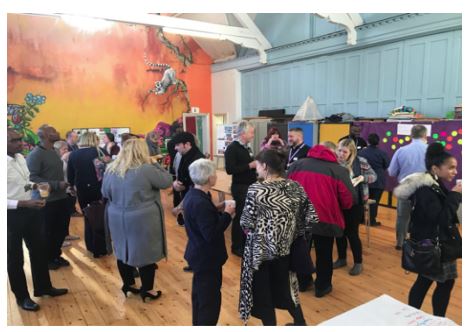
The report of the participatory neighbourhood event held in November 2018,
Connecting Chorlton, Fallowfield & Whalley Range
Promoting Cross Sector Neighbourhood Working.
It is intended that this can be used as a resource for people who might want to run similar events and gives details of how the event was initiated and run, and what came out of it on the day and from the action points .
e.g. the development of ward based cross sector groups, new health and wellbeing activities, the continuation of networking lunches, and the establishment of a Self Care and Social Prescribing forum.
The resource includes contact details and links to useful websites.
Click below to read the Report: